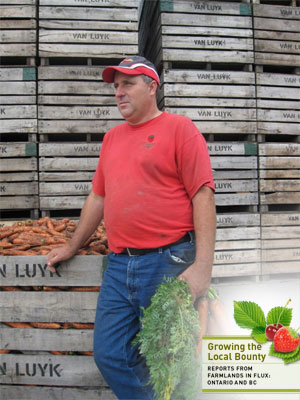
Jamie Reaume holds up a huge carrot, black soil still clinging to it. "Farmers don't care about a little dirt," he declares, taking a bite. The rich dark soil, after all, is a matter of pride for the people who live in Holland Marsh, also known as Ontario's salad bowl.
It literally is a bowl, an 18,200-acre region north of Toronto that was once entirely swamp. In the early 1900s, surveyors realized that the "muck" soil underneath was highly fertile. Since then it's been drained for agriculture, and now farms cover roughly 60 per cent of it. They produce about 10 per cent of all of Ontario's vegetables, and generated $29 million in 2006, according to Statistics Canada.
Farmers here send produce south to Toronto by the tractor-trailer load. They have no interest in farmers' markets or buying clubs. But even for large-volume producers, it's difficult to stay in business. Prices haven't kept pace with the cost of everything else and it's getting hard to compete with imports.
Reaume is the executive director of the Holland Marsh Growers Association, which formed in 2008 with funding from the Friends of the Greenbelt Association, to try and capitalize on a growing interest in local food and access new markets willing to pay a premium for made-in-Ontario produce.
And they're doing it with help from Local Food Plus (LFP). Executive director Lori Stahlbrand describes the non-profit as a "relationship building" organization. The local food movement is largely driven by people's desire to know and trust where their food is coming from, she explains. LFP is trying to take it to the next level by creating a network of certified local and sustainable growers and connecting them with high-volume commercial customers, places like restaurants, retailers and especially large public institutions like universities and municipalities.
"All of that alternative stuff, farmers' markets and CSA boxes, even if you add in all of the organic food sold in the big chains, adds up to about four per cent of the entire market, of the actual value of food sold in the marketplace," says Stahlbrand. "They're really important in terms of some farmers making a good living and they can be really important for engaging people around food. But 96 per cent is still the same old, same old. It has to go beyond the alternative sources for this to really make a difference in a big way."
How Local Food Plus works
LFP goes about doing this in several ways. The first step is ensuring potential buyers can identify what is local and sustainable. LFP's certification system works by rewarding farmers points for meeting certain standards in four areas: crop production or animal welfare, energy use, biodiversity and labour standards. Farmers require a score of 75 per cent (out of an average of 1,200 points) plus must meet certain mandatory conditions in order to be certified, for example, GMO's are prohibited.
Holland Marsh grower Doug Van Luyk says certification is basically a set of best management practices, which here in Holland Marsh, they're doing anyway. But this marsh is unique in that it falls under several protection plans and legislative acts, including the Greenbelt Act, the Lake Simcoe Protection Plan, that regulate farming activities and limit pesticide inputs through an integrated pest management plan. "What it shows is that you're basically following all the rules," says Van Luyk.
So why get certified? "You want to know the real reason?" Reaume interjects. "Food Inc."
The film about industrial farming had big effect on the local food movement, and essentially, Reaume explains, these farmers want to show that they aren't that -- that they aren't corporations, that they have families, they work long hours in the fields with their employees when they have to. "And you know what?" he says. "Local food plus provides a third-party certification process that allows the consumer to say... they're a farmer, they're not a producer."
Most of the farmers here still sell to just a few main buyers -- Loblaws, Metro and Sobeys – and while you can now see the Local Sustainable Holland Gold label in these stores, it's too early to tell whether it's helping sell more produce. And LFP has no formal relationship with these retailers to market it specially. "As the program expands, I hope that one day we will be able to work with them," Stahlbrand says. "Frankly, we're too small right now."
Instead, LFP is focusing on where it has found success: with large public institutions that can see the environmental, social and economic rationale for supporting local sustainable food. Five years ago, they helped the executive chef at one of the University of Toronto's largest residences develop a plan to buy more local produce. The chef, Jaco Lokker, started by devoting 10 per cent of his food budget to local sustainable food, and is now up to 22 per cent.
More recently, LFP partnered with the City of Markham, ON, to help it become the first municipality in North America to have a local food procurement policy. Others are jumping on board. Last October, Toronto city council agreed to develop a plan to achieve 50 per cent local food procurement for its daycares, shelters and seniors' homes.
Most municipalities have the impression that international trade laws prohibit them from giving preference to local growers in their service contracts, says Stahlbrand. But so far, "anything we've come up against we've been able to get around."
That's because many of these institutions and jurisdictions, including Markham, contract private companies for food services. "At the point where there is a renewal of the contract... if we're brought in to help work on the request for proposals, then we can work with the institutions to help them shape the language and work through how the program would work, based on our experiences and our understanding of the supply chains, and then that goes into the proposal," says Stahlbrand. "And then all the bidders are now committed to it."
Who wants to be a champion?
But working with institutions does require a champion, says Stahlbrand, someone who understands the institution, the politics, and is committed to getting administration on board.
"And if you find a person like that, you can make it happen," says Stahlbrand. "We go where there's interest. We figure there's no point banging our heads against a brick wall, when there's more than enough retailers and restaurants and institutions that... see the value in this."
Local Food Plus is now putting down roots in British Columbia. It's partnered with six farmers who are becoming certified, and Stahlbrand was recently in Vancouver meeting with administrators at Simon Fraser University.
While it's a choice now, Stahlbrand envisions a future when peak oil prices will make imports and exports impossible. We need to be ready for that, she says, which is why her organization is trying to build capacity now.
"We don't know how long a system where you're bringing in food from far, far away is going to be able to survive. There's all sorts of things that can disrupt those supply chains. And we don't want to become completely dependent on that." ![]()
Read more: Local Economy, Environment

















Tyee Commenting Guidelines
Comments that violate guidelines risk being deleted, and violations may result in a temporary or permanent user ban. Maintain the spirit of good conversation to stay in the discussion.
*Please note The Tyee is not a forum for spreading misinformation about COVID-19, denying its existence or minimizing its risk to public health.
Do:
Do not: